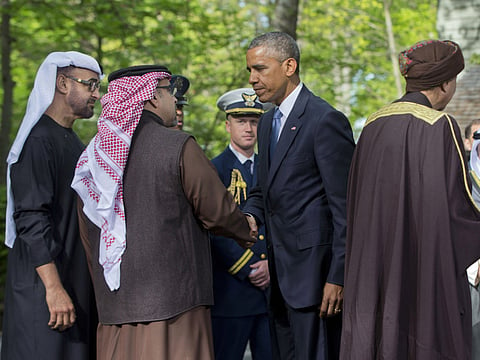Brainstorming at Camp David
What Washington and Tehran seem oblivious to is the direct linkage between Iranian policies in so many Arab countries and increased tensions

Few doubt that the World’s major powers will sign an agreement with Iran by June 30 that, inter-alia, will allow Tehran to emerge as a nuclear state even after a short hiatus. In light of that now inevitable reality, US President Barack Obama invited the leaders of the six Arab Gulf countries to Camp David where he tried to assuage Gulf Cooperation Council (GCC) concerns and, perhaps, offer iron-clad security guarantees. As expected, both sides engaged in careful spin, though the summit meeting fell well short of Obama’s ambitions that, regrettably, will have serious consequences for everyone.
To be sure, none of the participants expected the summit to erase existing doubts about Washington’s real intentions, although most hoped that Americans will erase some of the mistrust GCC leaders harbour towards Obama’s steadfast policy preferences, especially with respect to Iran. Still, while none of the monarchs or their representatives expected Obama to accept their interpretations of perceived threats, or share their visions of unity to confront the latter (since everyone was aware that Washington was persuaded that Iran was a force for good in the Gulf region and throughout the Arab and Muslim worlds), they at least intended to communicate “understandings and misgivings”.
In the end, what GCC states got from Obama was a pledge to strengthen existing bilateral strategic partnerships, enhance cooperation in matters of defence, supply fresh — but not necessarily the most sophisticated — arms, cooperate on critical counter-terrorism plans, coordinate maritime and cybersecurity initiatives and defend against ballistic missiles that presumably would originate from Iran.
These were valuable pledges even if Arab Gulf states were amply aware that their relationships with Washington stood a notch below full-fledged alliance commitments and that the US intended to move forward with Iran on a nuclear deal, especially after Obama explained that he wanted to be “very clear”. “The purpose of security cooperation” with GCC member-states “is not to perpetuate any long-term confrontation with Iran or even to marginalise Iran”, he insisted and while none of the Arab Gulf states wished to either go to war with, or even disregard, their neighbour, all were wary of Tehran’s hegemonic aspirations over them.
This was the crux of the matter and while nothing was leaked to confirm whether GCC leaders reminded the Obama team of Iran’s deeds as the summit progressed in Maryland, Washington was particularly timid towards Iran’s Revolutionary Guard Corps attack on a Singapore-flagged cargo vessel in international waters in the Gulf, opting to transform its timidity into partial acquiescence. How such a blatant infraction could be overlooked was a mystery. Naturally, it was logical to assume that summiteers discussed salient concerns ranging from Iranian backing of extremists in Iraq, Syria, Lebanon, Bahrain, Yemen and elsewhere, though no signs emerged that the White House linked GCC fears with Iranian intentions. The joint communique along with its more comprehensive annex dotted the i’s and crossed the t’s, though on Iran, it simply pledged to “continue consultations on how to enhance the region’s security architecture” and to “cooperate in countering Iran’s destabilising activities in the region”.
Of course, American officials assured Gulf leaders that “the objective is to deny Iran the ability to obtain a nuclear weapon”, though few knew the terms of the putative deal. It fell on Adel Al Jubeir, Saudi Arabia’s new Foreign Minister and former ambassador to the US to warn that Riyadh would wait to decide “what we accept, what we don’t accept”, based on the fine print. Speaking at the annual Asan Institute Plenum in Seoul, South Korea, a few weeks ago, Prince Turki Al Faisal, the former Saudi intelligence chief, was crystal clear, however. Prince Turki delivered an impeccably unambiguous statement when he hammered that “whatever the Iranians have, we will have, too”, which was probably the blunt message that Crown Prince Mohammad Bin Nayef carried from King Salman Bin Abdul Aziz to Obama.
Indeed, the Saudi monarch’s determination was lauded throughout the Gulf region, with Ahmad Al Jarallah, the editor-in-chief of Kuwaiti newspapers Al Siyassah and Arab Times calling on the American head-of-state to “Stop ‘Pacifying’ Us”. Al Jarallah and others clarified that while GCC states led by Saudi Arabia wished “to keep the region away from war”, they were determined to defend themselves “when war is imposed” on them.
On that score, at least, Riyadh and Washington saw eye-to-eye since the US did not contemplate fresh wars in the region as the Obama administration sought political solutions to several crises. Even the US war on terrorism, once flouted as a perpetual engagement until the end of time, was now fought with remote-controlled drones and intermittently. What everyone presumably wished to avoid were escalations between Saudi Arabia and Iran, for example, since a full-scale war would drag the US back in an arena Obama wishes to extricate the country from.
Nevertheless, what Washington and Tehran seem oblivious to is the direct linkage between Iranian policies in so many Arab countries and increased tensions. GCC leaders assembled in Camp David were aware that the long-standing American goal was to prevent any regional or international force from gaining a hold over the Gulf region. That was why GCC representatives adopted a realistic strategy, one that banked on sheer determination to defend oneself — alone or with allies — and on time.
Time to acquire the necessary wherewithal. Time to acculturate new leaders to rapidly changing political environments. Time to engage with friend and foe alike without capitulating to either.
Dr Joseph A. Kechichian is the author of Iffat Al Thunayan: An Arabian Queen, London: Sussex Academic Press, 2015.

